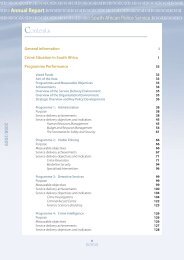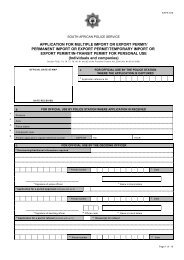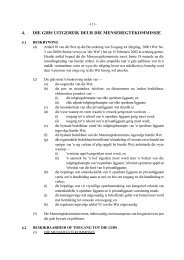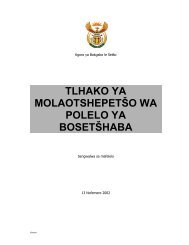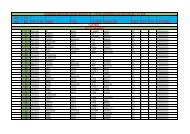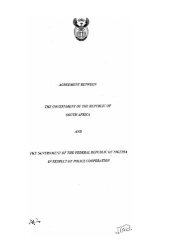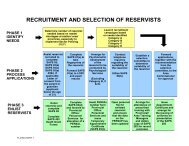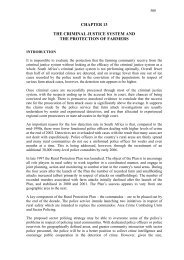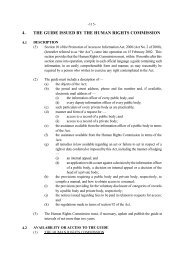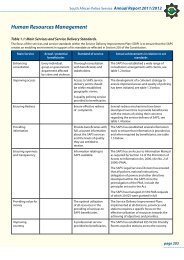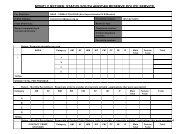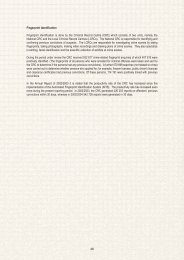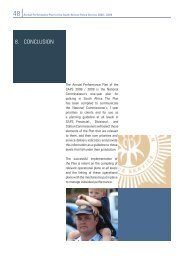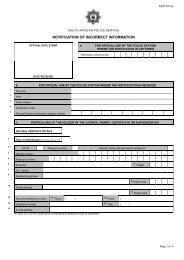Untitled - Saps
Untitled - Saps
Untitled - Saps
You also want an ePaper? Increase the reach of your titles
YUMPU automatically turns print PDFs into web optimized ePapers that Google loves.
1998<br />
10 Years of Policing in a Democracy 1995 – 2005<br />
32<br />
• In March 1998, the first 18, locally-trained polygraph system operators - nine police<br />
officials and nine SANDF members - graduated from the Detective Academy in<br />
Silverton, Pretoria. The course, presented by the US Argenbright International Institute<br />
of Polygraphy, was the first of its kind to be presented locally.<br />
• Project Johannesburg was launched in April 1998 to develop a new style of policing that<br />
was less bureaucratic, more cost-effective and community friendly, with an enhanced<br />
capacity to fight crime. Encompassing 20 police stations in the Johannesburg police area,<br />
between R30 and R35 million was allocated to the project out of the SAPS budget.<br />
• In April 1998, a plan to reconstruct the SAPS was presented to Parliament’s Safety and<br />
Security Portfolio Committee. The plan included -<br />
- delivering professional “customer service” by improving the public image of the<br />
police, as well as improving the discipline, morale and investigative techniques of the<br />
police;<br />
- recruiting civilian employees and permanent members to alleviate the heavy<br />
caseload of police officials; and<br />
- establishing crime information centres to form a ground-level database and creating<br />
crime-prevention and reaction units.<br />
• In June 1998, it was announced that the SAPS would take in new recruits over the<br />
following five years. A total of 1 200 recruits were enlisted in the SAPS in a rolling intake<br />
process during which 300 recruits were enlisted at a time.<br />
• More than 2 000 stolen vehicles, worth R9 million, were seized during a cross-border<br />
operation involving police officials from South Africa, Swaziland, Lesotho and Mauritius<br />
in June 1998.<br />
• Owing to ongoing violence in the Richmond area in KwaZulu-Natal, an operation<br />
called PAX II was launched in July 1998. It was a joint operation between the SAPS<br />
and the SANDF, which improved stability in the region.<br />
• In August 1998, three members of the FBI and a member of the Department of Justice<br />
attended one-day workshops where detectives taught them techniques of neutralizing<br />
criminal enterprises. Five top forensic scientists of the FBI Forensic Science Laboratory’s<br />
Trace Evidence Unit in Washington presented a two-week training course at the National<br />
Forensic Science Laboratory in Pretoria. The course was the first presented by the<br />
FBI in Africa.<br />
• In September 1998, the Detective Academy officially launched the first Generic Serious<br />
and Violent Crime pilot training programme. Thirty-one provincial heads of Serious<br />
and Violent Crime units, as well as managers from different specialized police units,<br />
attended the course. Training focused on the fields of murder and robbery, vehicle<br />
hijacking, taxi and gang violence, serial killings and illegal firearms. Subjects such as<br />
major case management, sophisticated investigative techniques and partnerships with the<br />
community were also dealt with.<br />
• In September 1998, the SAPS launched a R40-million project aimed at dealing with<br />
the escalating incidence of suicide and violence in the service. The project, known as<br />
the National Suicide Prevention Project, concentrated on researching, managing and<br />
preventing further losses of human lives.<br />
• A manual entitled Human Rights and Policing introduced police officials to the Constitution<br />
and to the principles underlying human rights. Management and leadership development<br />
programmes in the service included the Learning Intervention of Supervisors through<br />
the Operational Management Programme for Officers, the Station Management<br />
Programme (presented by the Joint Universities Public Management Education Trust<br />
with funding from the South African Management Development Institute), the Middle<br />
Management Programme and the Leadership Development Programme.<br />
• The Emerging Leadership Programme (ELP) was presented by the Kagiso Leadership<br />
School and was funded by the European Union.



